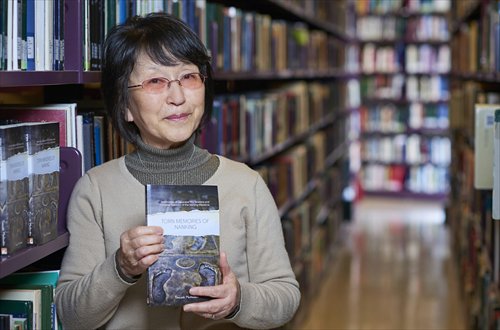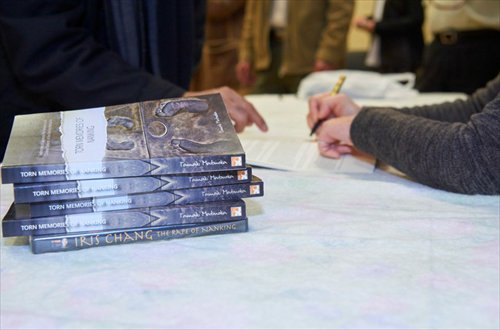Former teacher fights against Japan’s denial of Nanjing Massacre

Tamaki Matsuoka and her new book Photo: Courtesy of ALPHA

Tamaki Matsuoka signing her books Photo: Courtesy of ALPHA
Tamaki Matsuoka, a writer and former teacher who has long been a headache for Japanese right-wingers, got on their nerves again when she published her new English-language book on the Nanjing Massacre.
In her book Torn Memories of Nanking, which was published in Canada by the US-based non-profit ALPHA Education in April, Matsuoka chronicles the massacre and compiles testimony from both Chinese victims and Japanese veterans.
In December 1937, when the Japanese invaded Nanjing, also known as Nanking, Japanese troops carried out mass killings, rape and robbery against the residents of Nanjing. The number of deaths is generally regarded to have exceeded 300,000. But these facts have long been concealed by the Japanese government.
Matsuoka hopes the book can expand Western readers' knowledge of the War of Resistance against Japanese Aggression (1931-45).
The book is the culmination of Matsuoka's 28-year-long investigation into the tragic massacre. The author, who is now in her 70s, has previously published two other books containing testimony from the perpetrators and victims of the Nanjing Massacre. But this is the first time that the testimonies of the two sides have been put together for comparison as hard evidence.
"Currently, Japan has kept its history of conquest and invasion hidden from society, and the ordinary citizens have grown to not only have misconceptions about history, but has also begun to reject historical truth," Matsuoka told the Global Times. "However, this increasingly common attitude towards seeking the truth must not be allowed to prevail."
"If the truth about the Nanjing Massacre and other historical events are steadily spread across society, there will definitely be a steady increase in awareness," said Matsuoka.
Driven by conscience
Matsuoka has made revealing the truth her lifetime goal. Over the past 28 years, she has visited hundreds of Japanese veterans and Chinese victims of the massacre.
She has traveled to Nanjing dozens of times, visiting survivors, memorials and historical sites to collect materials and record them in books and documentaries to spread a truth that she believes has been deliberately concealed in Japan.
Now called "the conscience of Japan" by many Chinese, Matsuoka didn't expect to become a fighter for historical truth when she began her work 28 years ago. At that time, she was an ordinary history teacher at a primary school. But the routine of her life was broken one day after she listened to a survivor's memories of Nanjing and realized that the Japanese government was concealing its role in this history.
"Upon learning of the pain and suffering that the survivors of the Nanjing Massacre carry on till this day, I felt that it is our responsibility as fellow humans to refuse to turn a blind eye towards attempts to cover up the truth," said Matsuoka.
According to Matsuoka, history textbooks in Japan heavily conceal historical facts and details pertaining to the period in which the massacre took place.
"It is a teacher's duty to teach children the truth. I was unwilling to use the recommended Japanese teaching materials," said Matsuoka.
Matsuokasaid that every time she visits Nanjing, she is greeted by the now-elderly survivors of the massacre, who often tell her: "You must be a teacher. Please teach the next generations about the truth of the massacre."
Matsuoka says this support is what has helped her persist in her ongoing investigation.
Confronting the right wing
Matsuoka visits the survivors every year in Nanjing around the memorial date of the massacre. But in Japan, "in children's textbooks, there is little to no content on Japan's war of aggression, and Japanese society continues to be unaware of their country's past acts of aggression towards China and the rest of Asia."
Several years ago, Matsuoka produced an 85-minute documentary that has never had official approval in Japan. She has had to show the film in Japan at underground screenings.
According to Matsuoka, she tried to make her books available in English in the US in 2007 but failed. But the biggest difficulties she has experienced, including threats to her life, came from right-wing forces in her own country.
"Right-wing forces view nationalistic goals and ideologies as extremely important. They argue that it is impossible for Japan's troops to have committed such atrocities under the sacred leadership of the Emperor. Thus, these right-wing forces conclude that historical details pertaining to the Nanjing Massacre are the work of 'disloyal citizens,' 'who do not truly love their country,'" said Matsuoka.
Matsuoka said she was often pressured to stop being a teacher after she started her investigation, and rumors that she was spreading lies about the massacre were spread in her school's neighborhood.
Right-wingers even showed up at her gatherings and said she was a "pawn of the Chinese government" in some occasions. Matsuoka has told the media that she often fears for her safety when she goes out alone and never stands near the platform's edge when waiting for the subway in case someone tries to push her onto the tracks.
She has made preparations to protect the materials that she has collected over the years, distributing copies of her work to people she trusts.
"The threats and interference I have put up with from right-wing nationalists have fueled my fighting spirit to investigate deeper into the Nanjing Massacre, as well as film-making," Matsuoka said.
Warning signs
Matsuoka started her investigation by visiting survivors in Nanjing. But when many Japanese said their stories were "made up," she realized she needed evidence from Japanese veterans too.
Throughout the years, she has interviewed 250 Japanese veterans, who have revealed bloody details of the killing, but few of them were reflective about that war. She put this down to Japanese society's reluctance to face up to history.
But Matsuoka still managed to find a veteran who reflected on his deeds. He told Matsuoka just before his death that he had raped Chinese women, which made Matsuoka more resolute about the significance of collecting testimony about the massacre.
She plans to expand the new book to form a larger compilation of perpetrator-to-victim testimonies about the massacre. "I wish to make such content accessible not only for the English-speaking community, but also for Japanese and Chinese communities."
Matsuoka hopes the books can let ordinary citizens learn the truth about the massacre and understand the pain and suffering felt by its survivors.
"In addition to supporting the survivors of the Nanjing Massacre, I believe that we can begin to learn from past atrocities, ensuring that no one resorts to such acts of violence ever again," said Matsuoka.
Newspaper headline: Teaching the truth